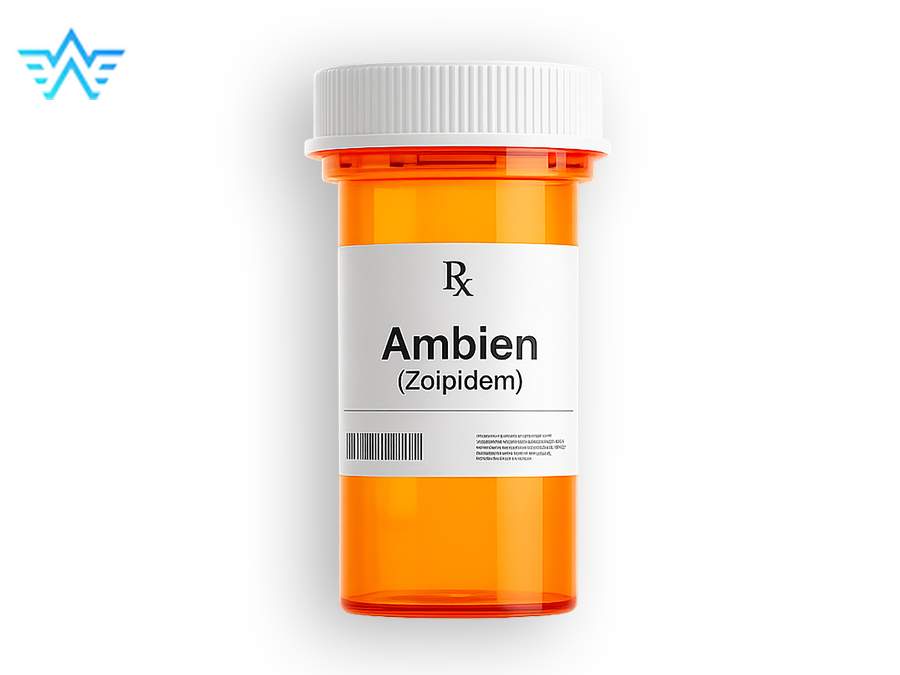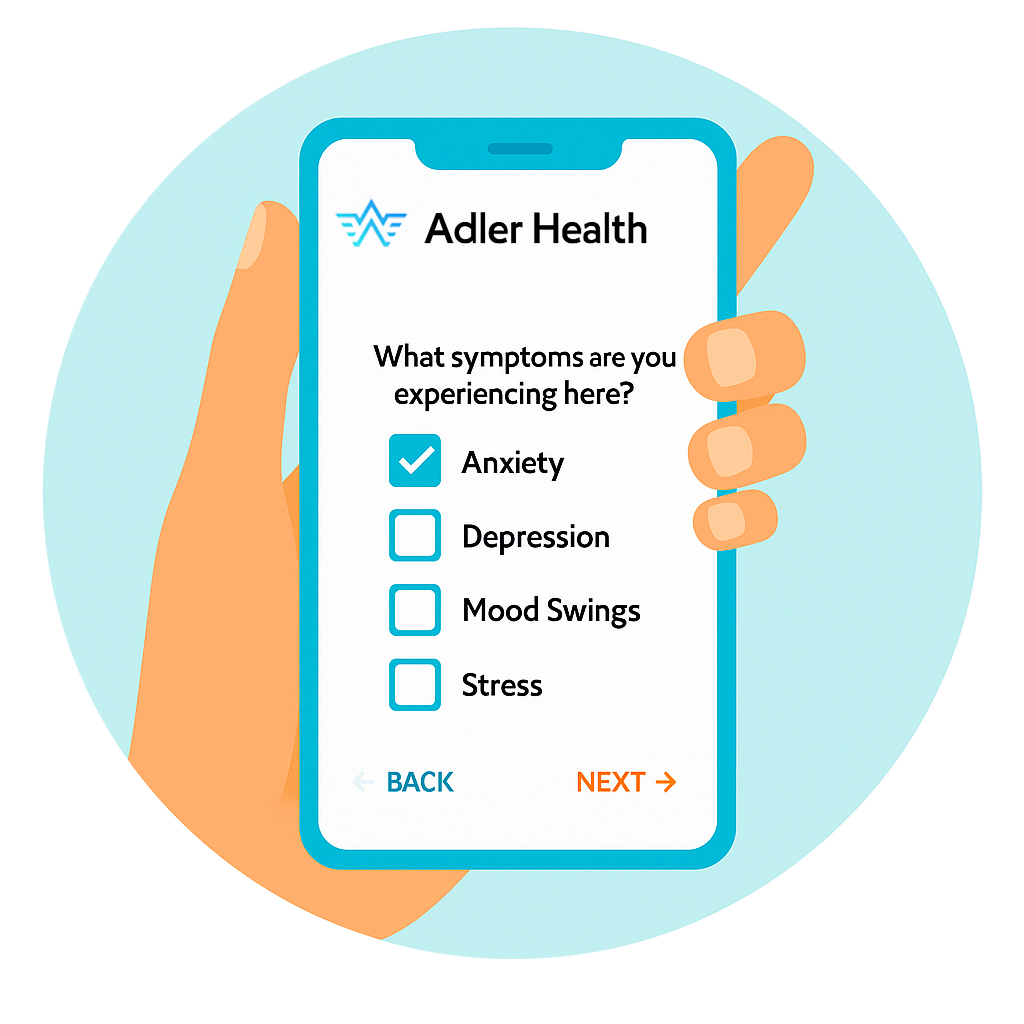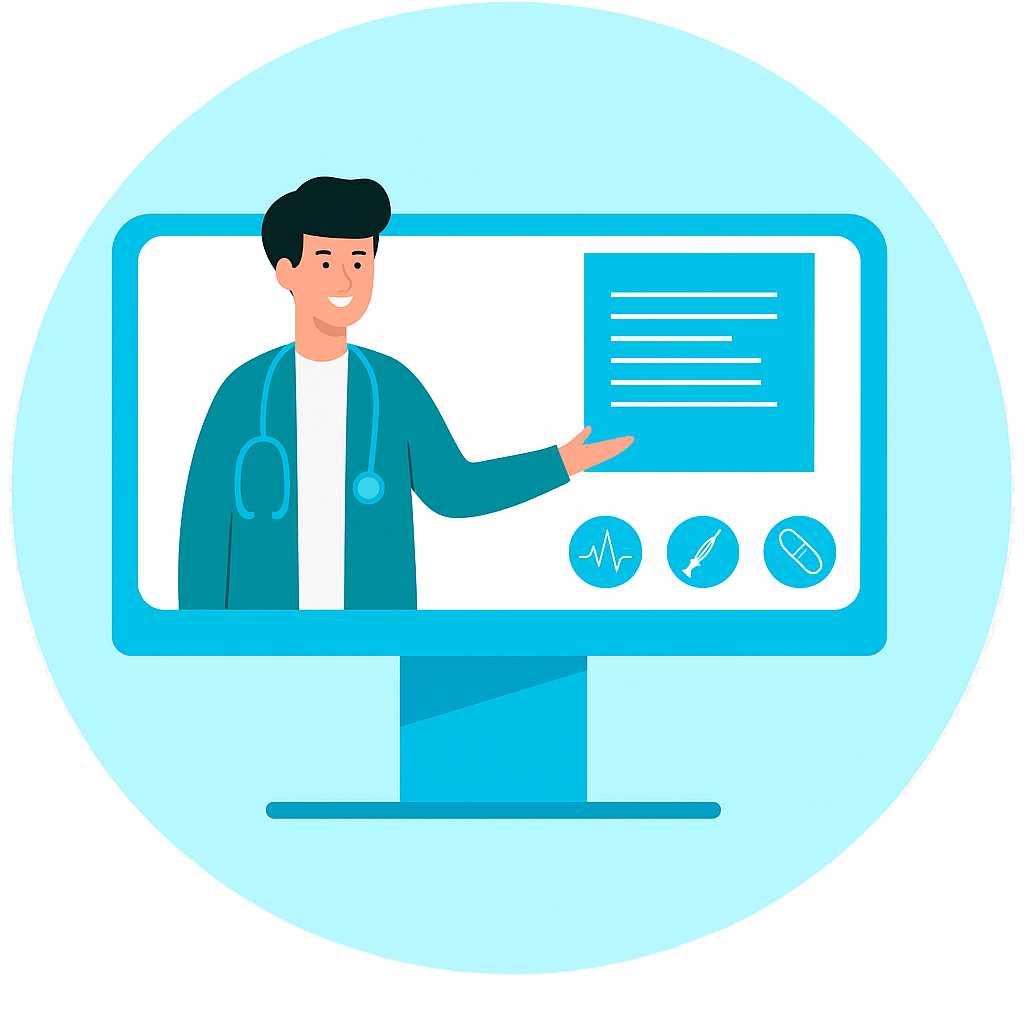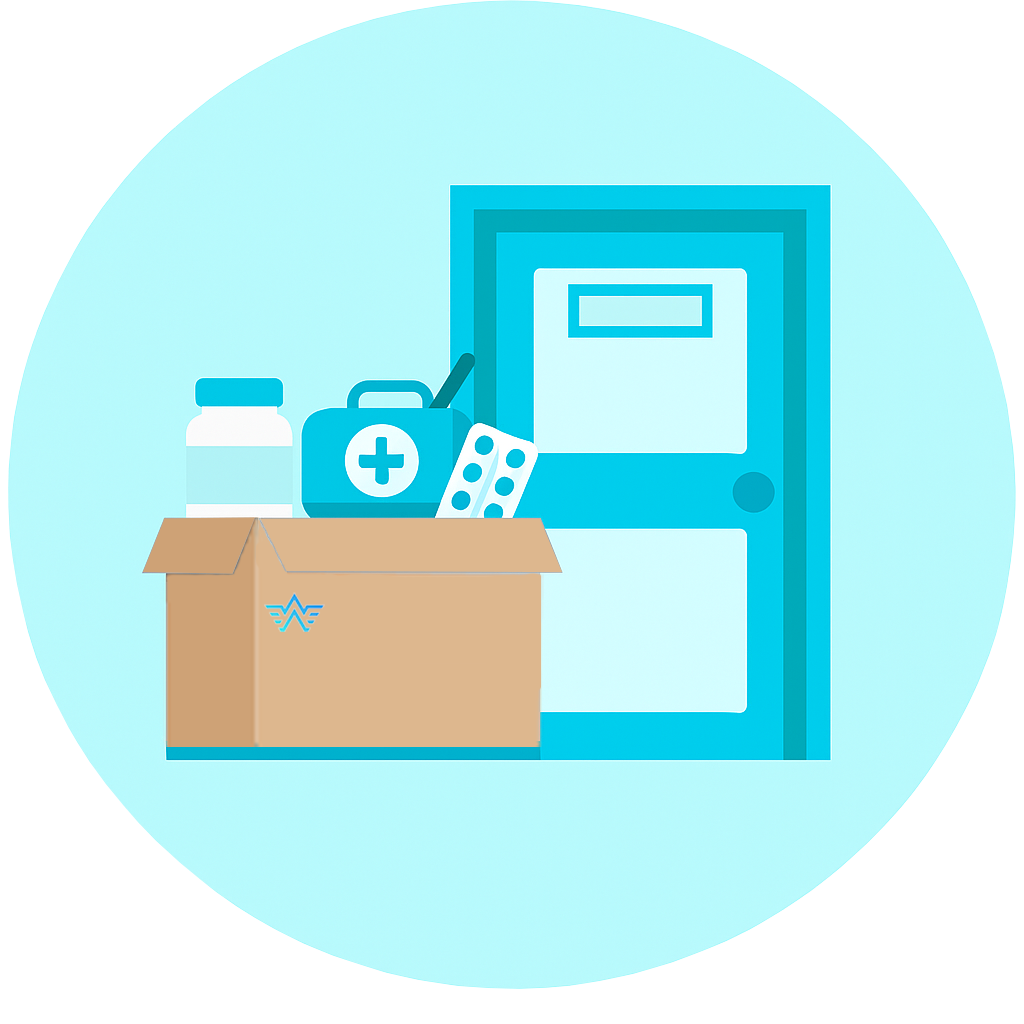Buy Zolpidem Online | Secure Professional Consultation
Zolpidem (Ambien) is a non-benzodiazepine receptor modulator approved by the FDA for short-term treatment of insomnia, especially for people who have trouble falling asleep. It helps reduce how long it takes to fall asleep, increases total sleep time, and lowers the number of nighttime awakenings in cases of transient insomnia. In patients with chronic insomnia, it can also improve overall sleep quality and has mild muscle relaxant effects. Zolpidem (Ambien) requires a prescription from a qualified health specialist. Adler Health ensures you're in good hands with experienced professionals.

Starting at $3.10/ pill
Dosage and Administration
Long-term use of Zolpidem (Ambien) is not recommended. Still, what is the optimal daily dose of Zolpidem (Ambien)? And how large an Zolpidem (Ambien) dose is too large?
Zolpidem, often used to treat insomnia, affects the brain’s neurotransmitters and can cause dependency, side effects, or dangerous interactions with other drugs. That’s why a licensed physician must evaluate the patient's health, consider any underlying conditions, and determine the proper dosage and duration.
Ambien should be used exclusively orally, the duration of therapy, dosage are determined by a specialist.
Zolpidem (Ambien) is normally taken once per day before going to bed in acommonly prescribed daily dose of 10 mg. Topping it with 1–2 more tablets of Zolpidem (Ambien) severely increase the risk of adverse reactions, so think twice before overdosing. Dangerous health problems may start with 7 time the normal amount (i.e. 70 mg) consumed in one take. Zolpidem overdose, though, starts from a significantly higher level: near 40 times the prescription dose.
To have an Zolpidem (Ambien)-assisted full night’s rest, you should first make sure that you have finished your work and nothing would disturb you in the evening. Your prescribed dose of Zolpidem (Ambien) should normally not exceed 10 mg. Get your medication ready, remove any disturbing factors and make yourself cozy under the blanket.
For medical reasons, you should follow the instruction as closely as possible. Avoid crushing or chewing the tablets because this makes the drug release too rapidly. The appropriate administration is critically important for a controlled release form of the medication.
Both controlled release form and immediate release form of Zolpidem (Ambien) are administered orally. This also decreases the chance to overdose on Zolpidem (Ambien), which is extremely sensitive to the route of administration. Other ways of maltreatment are as follows:
- ignoring the suggested dose and increasing it;
- taking lightly the prescribed dosage regimen and varying the frequency;
- crushing the tablets and snorting them, or dissolving them in water and making an injection.
Both insomnia and disorders ofsimilarnature have been popularly treated with Zolpidem (Ambien) for a decade. The available dosage forms of Zolpidem (Ambien) includeprolonged-action and concentrated-action tablets. The tablets differ in strength from 5mg to 10 mg.
Although possibly reachable, an overdose of the drug happens in relatively rare cases. While one to two additional tablets of Zolpidem (Ambien) might not feel very adversely inan adult’s body, thepossible side effects of this sleeping drug make the slight extra benefit totally unworthy. Upon reaching 400 mg, an Zolpidem (Ambien) patient experiences a non-lethal overdose. Finally, Zolpidem (Ambien) doses of 2000 mg were reported to be lethal.
Due to the risk of dependence, Zolpidem (Ambien) is rarely prescribed for a period exceeding 2–3 weeks. Healthcare specialists also warn insomnia sufferers of a gradually built up tolerance to Zolpidem (Ambien) and advise against escalating the dose on their own. In patients who were administered zolpidem at a regular dose for the above period, taking Zolpidem (Ambien) was associated with only a small increase in the risk of dangerous adverse effects. Aside from hallucination, those includednausea,blurred vision, and aggravation of the inability to sleep.
Persons who choose to take Zolpidem (Ambien) for “the thrill of it” put themselves at a particularly high risk of physical harm. The drug is notorious for the unpredictable nature of its side effects in an individual human organism. Abusers of Zolpidem (Ambien) experience a whole range of unpleasant or even life-threatening consequences, starting from “weird” sleeping behaviors (unconscious walking or driving) and up to permanent memory loss.
Whatever is your reason for overdosing zolpidem, this is inseparably linked with danger and can traumatize your body.
How It Works

Quick Health Check
Provide your medical history and describe your symptoms in a short online questionnaire. This helps us understand your situation thoroughly. It only takes 5–10 minutes.

Expert Review by Licensed Providers
Our board-certified mental health providers review your answers and build a treatment plan just for you. You’ll get updates in your patient dashboard.

Prescriptions Shipped to You
Should treatment be necessary, your medication is shipped promptly right to your door in plain, discreet packaging for your privacy.
Therapy, Treatment Services, Prescriptions at Adler Health
Side effects
More often, side effects bother women, but in general, Zolpidem (Ambien) is well tolerated. In some cases, negative effects may occur:
- Abdominal pain
- Drowsiness
- Vomiting and nausea
- Headaches and insomnia
- Diarrhea
- Amnesia
- Addiction
- Scabies
- Stupor
- Rash
- Hallucinations
- Lower blood pressure
- Pale skin
- Hyperhidrosis
- Overexcitation
- Paresthesia.
Zolpidem Addiction
So, Adler Health doctors has carefully observed your sleep problem and prescribed Zolpidem (Ambien). You tried it and things have become much better – still, you have some fears as for developing anaddiction to the drug.
Night disturbances and sleep issues are traditionally treated with the group of drugs known as benzodiazepines. The most popular of those are temazepam (Restoril), Lorazepam (Ativan) and Alprazolam (Xanax), the clinical efficacy of which depends on the particulars of a specific case.
Aside from different indications, these drugs also vary in their habit-forming capacity. Their most dangerous side effects include hallucination (not uncommon) and allergic reactions, such as anaphylaxis (rare). When compared to the above medicinal products, Zolpidem (Ambien) distinguishes by alower risk of causing drug dependence.
However, every sleep medication works on a deep level and therefore should not be passed over lightly. Even if you experience few or none of the possible adverse reactions, relying on hypnotics in treatment of insomnia is not the recommendable solution.
There always remains a chance that your current sleep disorder is caused by some deeper pathological change. If your sleeping pill of choice only alleviates the condition (which then comes back), it is possible that the prescribed benzodiazepine works for you as apalliative. Be careful to not get into a habit of medicating yourself to sleep, which has little to do with the real therapy.
The first thing that becomes affected by sleeping pills is your state of mental alertness. For instance, long-term use and abuse of zolpidem (Ambien) are known to cause sleep-driving and sleep-eating in some patients. Those behaviors also involve other activities of which the patient is not aware and does not remember doing them later (for instance, calling numbers of your friends without remembering the conversation afterwards).
According to recommendations of the FDA, people taking benzodiazepines and their derivatives should not engage in potentially dangerous activities.The prolonged effect of Zolpidem (Ambien) may result in feeling drowsy and light-headed the next day after using the drug.
It is, therefore, important that Zolpidem (Ambien) patient avoids theoperation of equipment and machinery that require great concentration and alertness. Normally, accurate prescription and short-term use give you a good guarantee of harmless treatment. This also lessens the risk of getting addicted to a negligible level.
Other psychoactive substances, such as coffee and alcohol, can interact with hypnotics and change their effect on the central neural system. That is, any bad effect that the drug causes can be worsened by consumption of energetics (coffee) and depressants (alcohol drinks). Even small amounts of alcohol can affect your ability to remember things and also cause a memory loss when combined with drug administration.
In reality, the danger of getting harmed by theinappropriate use of Zolpidem (Ambien) is significantly higher than the risk of developing an addiction. Zolpidem (Ambien) is rarely prescribed for more than 2–3 months – taken for longer periods, the drug loses its potency as your body becomes tolerant to it.
This requires escalation of the dose and subsequently results in drug addiction and severe withdrawal symptoms. Make sure you are using Zolpidem (Ambien) for appropriate indications and during safe time intervals; if in doubt, do not hesitate to get a second opinion.
Contraindications and Precautions
The medication should not be prescribed to people with intolerance or hypersensitivity. The medication is prescribed with caution in the presence of respiratory failure, chronic obstruction of pulmonary tissue, kidney disease, liver disease, muscle weakness, depression, and alcoholism. Also, the medication should not be taken in the presence of medication dependence, under 15 years of age, and with frequent abuse of alcohol and other potent substances.
Centrally acting antitussive medications, opioid analgesics, other sleeping pills, neuroleptics, anxiolytics, antidepressants, barbiturates, and antiallergic medications potentiate the suppressive side effects of the medication. Flumazenil is an antidote to Ambien. Tranquilizers that are classified as benzodiazepines potentiate the development of medication dependence more strongly. Alcoholic beverages increase the side effects of the sleeping pill.
Let Adler Health Serve You!
If you or a loved one is struggling with a mental health disorder or a co-occurring disorder, Adler Health is here for you. Contact us today to learn more about our mental health treatment programs and other resources.




